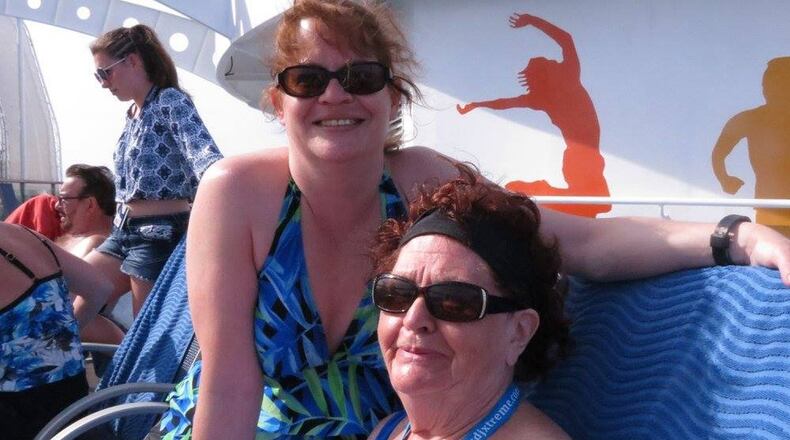For Susan Prince, being a good daughter during a global pandemic means staying away. She worries that a simple hug could turn deadly for her mother Nancy Dambach.
Chemotherapy for stage four lung cancer crippled Dambach’s ability to fight off germs. Even worse, Dambach is 80, which places her in an age group that has a far greater chance of dying form COVID-19, the respiratory disease caused by the novel coronavirus.
Prince, 48, warned well-meaning neighbors to come no closer than the front yard of Dambach’ Cumming home. She plans to visit by standing outside her mother’s screen porch, and will speak to her from about 10 feet away.
“I don’t want to lose her to this,” said Prince, of Sugar Hill. “I’m not ready to lose her. Ever.”
“That’s my Susan. I wish I had ten more of her,” said Dambach, who has lived alone since her husband died in 2014.
» COMPLETE COVERAGE: Coronavirus in Georgia
The pandemic is turning everyday life upside down for those with poorly-functioning immune systems, a wide-ranging group with illnesses that strangers cannot detect with the naked eye. They include cancer patients such as Dambach, cancer survivors, organ transplant recipients, those with conditions related to diabetes, individuals with certain genetic disorders, and people living with HIV.
Each of these diseases are different, and how the virus interacts with them will take years to understand. But people with weakened or malfunctioning immune systems all struggle to fight off infections, and may be more likely to have severe symptoms or die.
Even people who seem healthy can carry COVID-19, making staying six feet apart from others as the Centers for Disease Control and Prevention recommends a matter of life and death for these patients.
Some have gone far beyond the agency’s current recommendations by cutting off nearly all face-to-face contact with others, or spraying Lysol on packages and letters that come through the mail. Others have stopped ordering takeout, or pass out hand sanitizer, masks and gloves to visitors.
» RELATED: Georgia coronavirus cases rise to 287; death toll jumps to 10
» MORE: Increase in deaths, confirmed cases show that virus' toll is worsening
"It may sound extreme, but it sort of makes sense," said Dr. Richard Schilsky, chief medical officer of the American Society of Clinical Oncology. Patients don't know if the people who handled their groceries or packed their Amazon deliveries carry the virus, or follow CDC hygiene recommendations. It has released guidance for cancer patients and doctors on the coronavirus.
“Every decision point now becomes more complicated than it typically would have been,” Schilsky said.
Balancing risk
The risks posed by the coronavirus are so great for certain patients that doctors have decided to halt their treatment. Many cancer patients are older, or have other conditions such as heart disease and diabetes that appear to increase their chances of falling seriously ill if they contract the coronavirus.
People with diabetes can have hyperactive immune systems that fight infection badly, but treatments such as dialysis should continue with clinics and patients following CDC guidelines, said Dr. Robert Eckel, a co-president of the American Diabetes Association.
“There’s not really a special set of precautions beyond CDC guidelines,” Eckel said.
» RELATED: Supply shortages force health systems to devise own workarounds
» MORE: As hospitals fight to keep up, they tell mild cases not to seek tests
For some cancer patients, pausing chemotherapy can help them build up their immune systems. For others, stopping treatment may end all hope of curing the disease. The Winship Cancer Institute at Emory University issued guidance to its doctors last weekend on how to balance these risks, said Dr. Walter Curran, its executive director.
“We take the point of view of looking at the competing risk of cancer versus getting an infectious disease, and it’s really different for every patient,” Curran said.
Dambach and her family want to press on. An experimental form of chemotherapy shrank her tumors by 75% and she has only three more more weeks of treatment to go.
If she has her way, Dambach will live to see all of her seven grandchildren graduate from high school, and maybe even college. They are why she wants to stay alive.
“I love life,” Dambach said. “I love to get up in the morning. I don’t care if it’s stormy. It’s beautiful. You have to see the beauty in all things.”
Keep out
Doctors are keeping patients with malfunctioning immune systems out of clinics and hospitals whenever they can.
At Winship and other treatment centers, some checkups are being done by telephone, or are being postponed until it’s safer to come in. Waiting room chairs are being moved six feet apart.
After consulting with her doctor, Terri Lynne Willis, 41, a liver transplant survivor, cancelled monthly tests to check if her organs are functioning properly. Her immune system remains so fragile nearly three decades after her transplant that it took a year for her to shake off a 2018 fungal infection in her lungs.
» RELATED: Emory Healthcare patient dies from COVID-19
» MORE: As hospitals fight to keep up, they tell mild cases not to seek tests
“Excuse my language, but it was hell getting through that,” the Douglasville resident said. “I’d rather be a little bored and alive than in the hospital and unconscious.”
Patients at the Ponce de Leon Center, one of the largest centers for HIV and AIDS in the country, must stay on their therapy to keep their immune systems a strong. But many do not need to come through its doors to do that, said Associate Medical Director Dr. Jonathan Colasanti.
The center is assessing each patient over the telephone to decide whether they need to come in, Colasanti said. Pharmacists send prescriptions by mail, if they can. Some paperwork can be completed remotely. Those who must come in are screened for signs of the disease and have their temperatures taken at the door.
But certain regulations for the federal program that funds nearly all of the center’s services are putting patients at unnecessary risk. Prescription drug assistance rules can require patients to undergo lab work more frequently than they need to for their health, or force them to sign paperwork in person instead of online or by mail.
These rules hit the center particularly hard. Its patients are predominantly low-income and must take crowded buses and trains to get to the center. Also, it prides itself in hiring staff who are living with HIV.
“We want to protect them as well,” Colasanti said.
Frustration and hope
But during any outbreak, the actions of hospitals, doctors and patients can only go so far to protect people with weakened immune systems. Their well being depends on whether healthy strangers do their part to halt the spread of disease by washing their hands and staying away from bars and restaurants.
Footage of beachgoers and bar hoppers ignoring the warnings from public health officials angered Stephanie Perry, 30. Her immune system remains so weakened two years after battling a form of blood cancer that it can take two weeks for her to recover from an ordinary cold.
“It is dangerous for them to be out there. It’s dangerous for people like me,” Perry, a Rome resident, said.
Still, Prince works to prepare her mother for what’s to come. She and her two brothers coaxed Dambach into leaving her job as a hotel concierge to lower her risk of infection. She sprays Lysol on each bag and box she uses to carry supplies to her mother. At some point, it will be too risky for Prince to walk through her mother’s front door.
It will be hard for Dambach, who’d rather meet face to face. She said she likes to see whether people are smiling or sad. But these troubles will pass in time.
“I’m not going to stop living,” Dambach said. “You don’t go in the corner and you don’t feel sorry for yourself. You go on, and there’s a lot to go on for.”
About the Author
Keep Reading
The Latest
Featured





